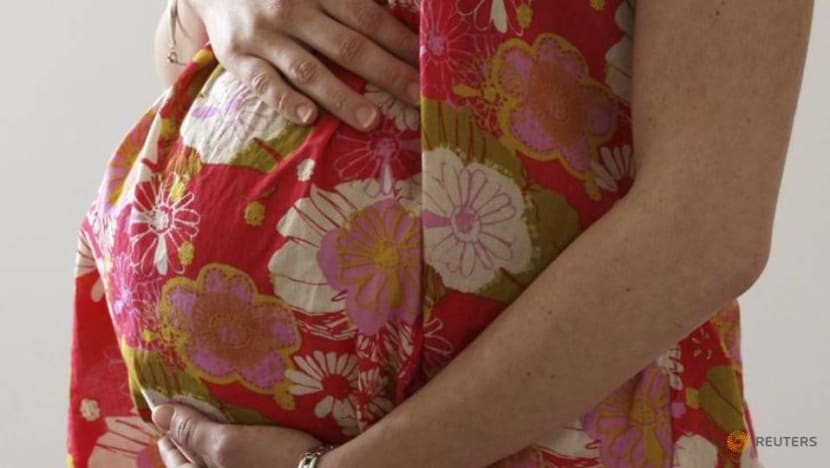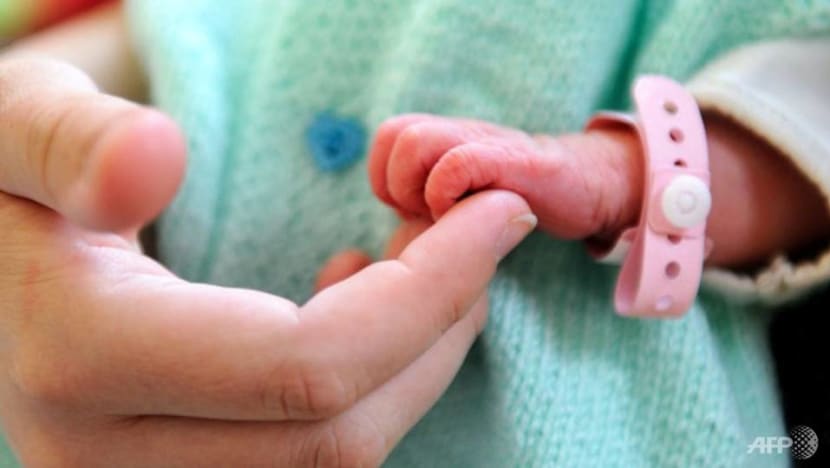commentary Wellness
Commentary: The cult of work is eroding the value of parenthood
The work of homemakers, driven almost entirely by females, often goes unnoticed as much of it occurs in the private domain, says June Yong.

A woman holds her stomach at the last stages of her pregnancy in Bordeaux April 28, 2010. REUTERS/Regis Duvignau
SINGAPORE: In today’s modern consumerist world, where financial and career success are heralded, childbirth is unfortunately seen by some as a career death sentence for women, or at least a pause button.
In a New York Times article, correspondent Claire Cain Miller goes as far as to say: “One of the worst career moves a woman can make is to have children.”
As society venerates the cult of more – more wealth, achievement, status, productivity – less economically tangible priorities may get left behind.
The work of homemakers, driven almost entirely by females, often goes unnoticed as much of it occurs in the private domain. Changing dirty diapers, whipping up a wholesome dinner, helping a young child regulate his emotions – all of these happen behind closed doors.
READ: Commentary: Is it wrong for new parents to have negative thoughts?
Similar to how we deem supermarkets as the main provider of our daily necessities and food, and relegate the mental image of a farmer toiling in the hot sun to the back of our minds, such is the unseen-ness of a mother’s hard work.
Moreover, in a materialistic and status conscious society, work that has no economic value attributed to it often gets little appreciation.
Why has the world of paid work, and its bedfellows of wealth and status, been elevated to such a point where other worthy pursuits, such as volunteer work or child-rearing, are trivialised?
READ: Commentary: Burden of caring for ageing parents weighs heaviest on unmarried daughters
KEEPING THE ECONOMY RUNNING VS RUNNING THE HOUSEHOLD
In recent decades, dual-income families are increasingly viewed as a middle-class necessity and the concept of the working woman has been lauded accordingly.

Due to government intervention, more workplaces in Singapore now adopt family-friendly policies, making it easier for homemakers, who have taken time off for family, to transit back into the workforce.
While this is beneficial as dual-income households get to enjoy greater financial stability, there is a price that is often overlooked.
Apart from being generally time-poor, such dual-income parents typically experience “role overload,” where the stresses of juggling work and family can sometimes overwhelm one’s resources and ability to cope.
READ: Commentary: Goodbye to those days, when women were 'pieces of meat for men to slice'
READ: Commentary: 'Super mums' have one simple request. Don’t hinder them from returning to work
It’s a catch-22 as for most lower and middle-income families, where both parents need to be working in order to support the growing family’s needs.
However, the presence of young children in a woman’s life can sometimes be an income glass ceiling; many get overlooked for promotions and pay raises as the assumption is that their time and energy is divided.
The help of a village – whether it comprises willing and able grandparents or a dependable helper – is a crucial determining factor as to whether the parents can juggle the conflicting demands of work and family successfully.
THE RISE OF WORKISM
In a 1957 article in The New York Times, the writer Erik Barnouw made a daring prediction: With increasing automation, work will become easier, and as a result, man’s identity would be defined by our hobbies or our family life.
But it seems like reality has bucked his prediction – particularly in Asia.
READ: Commentary: There is no shame in being a Tiger Parent
According to data published by the International Labour Organisation (ILO) in 2019, the region has the longest average work-week.
Three ASEAN countries are in the top 10, with Myanmar clocking 48 hours, Brunei, 47 and Malaysia, 46. Thailand and Singapore are in the top 20, with an average of 43 hours spent at work each week.
Derek Thompson, in The Atlantic, defines workism as “the belief that work is not only necessary to economic production, but also the centerpiece of one’s identity and life’s purpose; and the belief that any policy to promote human welfare must always encourage more work.”
In his article, Thompson alludes to the fact that while America’s richest men may have the onus to “live a little,” they are actually driving themselves to the bone.
And it’s not just confined to the ranks of the rich and wealthy. He writes:
Finding meaning at work beats family and kindness as the top ambition of today’s young people.
READ: Commentary: Cure to burnout requires a pervasive culture of rest
But the kind of work that gives rise to the purpose and identity that Thompson writes about is often unpaid and sown in tears and sweat. And the informal caregiving work that so often falls on women’s shoulders is just that.
Isn’t the joy of caring for one’s offspring, and nurturing them to be their best possible selves deeply purposeful and gratifying?
This is not to say that all paid forms of work are meaningless, purely economically-driven activities. There is a place for work, to find purpose in it, and it is necessary to provide well for ourselves and our families.
But have we all taken work a bit too far? Do we live to work, or work to live?
READ: Commentary: When parenthood comes knocking, life's never the same again no matter what route got you there
LISTEN: Women earning less than men: Who bears the burden of change?
Is it time to elevate the status of mothers so that they do not feel they’re being left behind?
NOT “JUST A MUM”
Michaella Thornton, in her January 2019 essay Pink Slips, describes a “disparate refrain,” where it is a significant event when a man loses his job, but when it comes to a woman’s layoff, especially a mother’s layoff, it is trivialised or used as an argument for her to stay home.
Why is a woman’s paid work seen as less important when she loses it, and yet if she doesn’t work, she is “just a mum”?
It seems that for mothers who have opted out of the workforce for a season to care for their children, this double jeopardy is commonplace.
I recall a few of my friends lamenting whenever they get hit with the question: “Why are you allowing your studies to go to waste?” Or: “What do you do at home all day long?”

Although society has progressed in many ways and women today are as educated, if not more so, than men, it seems women’s work in the form of unpaid childcare and eldercare remains unseen and unaccounted for.
Their paid careers are often not accorded the due respect and dignity too – deemed to be less important than that of men.
READ: Commentary: Let’s move away from caning and corporal punishment for our kids
Granted that the work of washing laundry and changing diapers isn’t exactly glamourous. Perhaps it is because we have grown up feeding on a steady diet of images of what success means.
This is intensified in today’s social media-immersed world, as posts of confident, beautiful women who seem to have it all shout out to us, making us wonder when it will be our turn to enjoy the “good life.”
When the stay-home mother shares another picture of her adorable cooing baby, is this as envied?
We all know we shouldn’t take such filtered images of achievement at face value, but why does it gnaw at our sense of well-being? After all motherhood can provide a very fulfilling and purposeful life if we approach it with the right attitude. How can shaping future lives not be important?
READ: Commentary: Why men should care and do more about women’s issues
Instead of chasing after the cult of work and the demi-gods of wealth, status, or even calling, it is perhaps time to turn inward – to look at motherhood, child-rearing and family as the nucleus of our being and the foundation from which the rest of life grows.
Maybe then it will be a whole lot harder to dismiss motherhood as just a punctuation in life that you just have to cross over.
June Yong is a mother of three, an educational therapist and owner of Mama Wear Papa Shirt, a blog that discusses parenting and education in Singapore.












